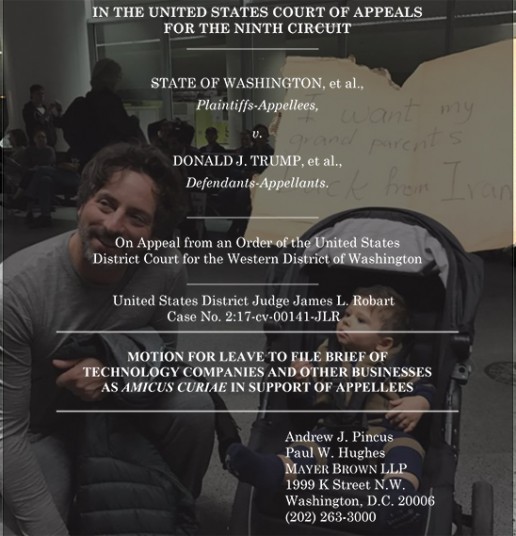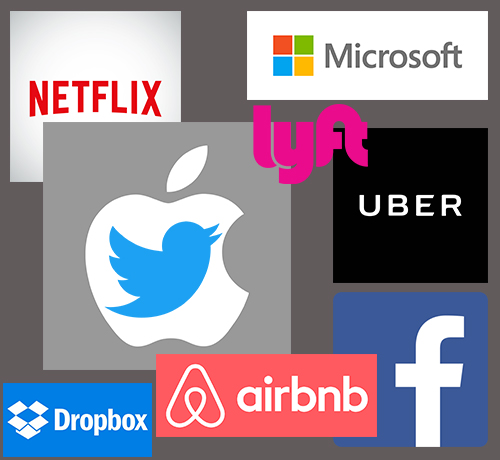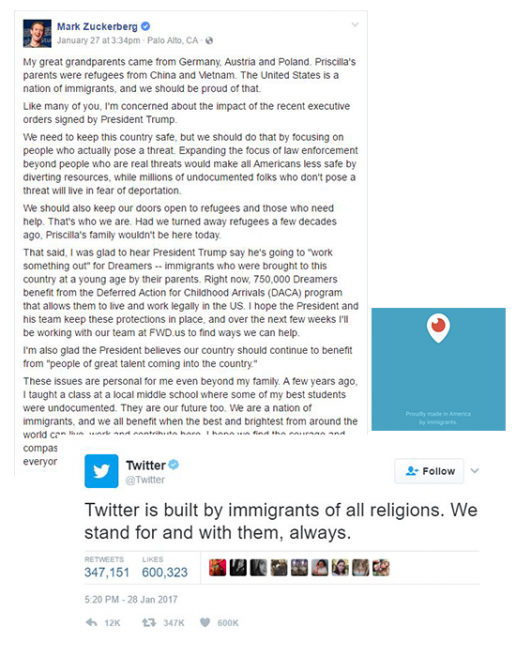On Sunday, 97 tech companies filed an amicus brief opposing President Trump’s executive order that restricted immigration to the U.S. from seven Muslim-majority countries.
Apple, Facebook, Microsoft and Twitter are among the nearly 100 companies that filed the brief to the 9th Circuit Court of Appeals in San Francisco. The brief criticizes the President’s order for being discriminatory toward Muslim immigrants and refugees and for the negative effect it would have on their businesses going forward.
“The order effects a sudden shift in the rules governing entry into the United States, and is inflicting substantial harm on US companies,” the brief reads. “It hinders the ability of American companies to attract great talent; increases costs imposed on business; makes it more difficult for American firms to compete in the international marketplace; and gives global enterprises a new, significant incentive to build operations – and hire new employees – outside the United States.”


Other prominent companies named in the brief are Airbnb, Dropbox, Lyft, Medium, Nexflix, Pinterest, Reddit and Uber. The inclusion of Uber is notable as company CEO Travis Kalanick was set to join Trump’s economic advisory group until public pressure forced him to resign.
Many of the tech companies named in the brief previously expressed their opposition to the executive order that banned Muslims from Iraq, Iran, Libya, Somalia, Sudan, Syria and Yemen. Shortly after the Muslim ban was announced, Twitter released a statement that expressed solidarity for “immigrants of all religions,” while Facebook CEO Mark Zuckerberg wrote on his profile wall to register his concern about the immigration order.
Other tech leaders took more direct action. Google co-founder Sergey Brin recently joined protesters against the ban and told the press that he did so “because I am a refugee.” The co-founders of the ride-sharing service Lyft, John Zimmer and Logan Green, criticized Trump’s ban and donated $1 million to the ACLU in an effort to combat it.
On Friday, Judge James Robert, a federal court judge in Washington state, granted a temporary block on the President’s executive order. As a result, restrictions on travel from the seven affected countries have loosened. Judge Robert’s decision was said to be a deciding factor in causing the tech companies to file its brief earlier than it originally intended.
President Trump railed about the federal judge’s decision over the weekend on Twitter, calling it “ridiculous” and promising that it will be overturned. The President will now await the decision rendered by the 9th Circuit in San Francisco – should it uphold the decision made in Washington state, the administration will likely appeal to the Supreme Court, thereby forcing a constitutional crisis.

Update: Feb 7th, 2017
Yesterday we reported that 97 tech companies–including such prominent names as Microsoft, Google, Facebook and Twitter–were uniting in an amicus brief against President Trump’s Muslim immigration ban. We can now add Elon Musk’s Tesla and SpaceX to the list of companies opposing the President’s executive order.
Since news of the brief was announced on Sunday, 29 other companies have joined the brief. With the addition of SpaceX and Tesla,, along with other prominent names like Adobe, HP, Bungie and Slack, the number of companies currently opposing Trump’s executive order now stands at 127.
As founder and CEO of both Tesla and SpaceX, Musk is now in the position of challenging Trump. Previously, Musk showed a willingness to work with the new administration, to the point where he accepted a position on the President’s advisory forum. It’s unclear at this time whether the decision to join his tech giant peers will change how Trump views the South African-born inventor and entrepreneur.
The 9th Circuit Court of Appeals in San Francisco is scheduled to hear oral arguments in the case this afternoon. The Justice Department has argued that the Trump administration instituted the travel ban in the interest of national security. No matter who wins the case, it’s all but guaranteed that the ruling will be appealed and sent to the Supreme Court for a final decision.